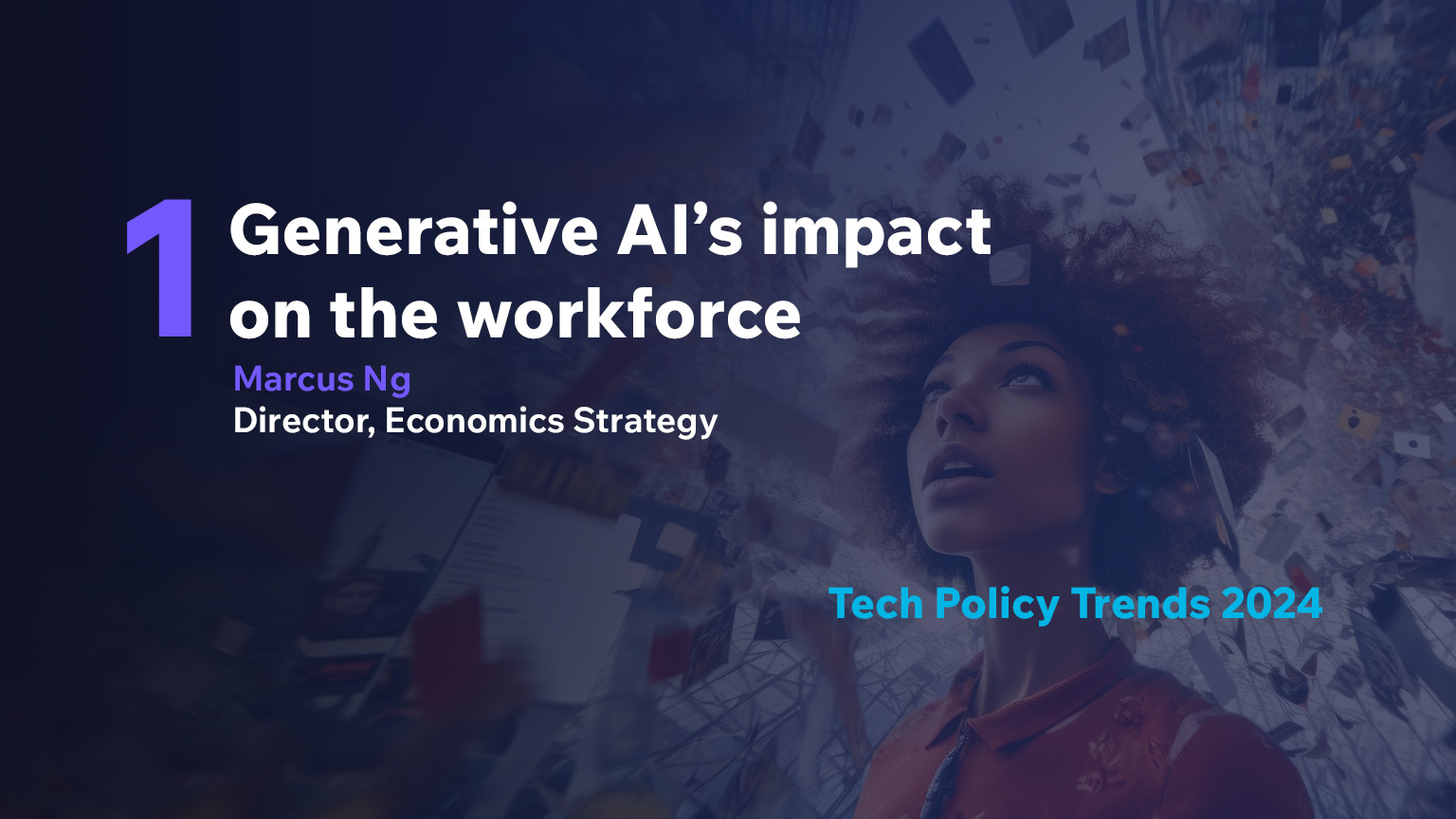

Marcus Ng
Leadership, Economics Strategy
Generative AI’s potential will continue to appeal to businesses, governments, and investors. Despite early moves by some policymakers, the AI governance debate continues. Against this background, what impact will it have on the workforce?
There will continue to be a rise in demand for custom generative AI applications that are language- and enterprise-specific and can support knowledge-intensive activities in expert domains, such as healthcare and finance.
This rise in demand will drive a dash for in-house AI talent that will overshadow the already high demand for AI skills. The global demand for AI jobs increased 11.3 times between 2015 and 2022, compared to 3.7 times for IT sector roles in general.[1] Even India, one of the most populous nations in the world with a tech industry employing 4.6 million workers, is running out of talent; current demand for AI talent exceeds its supply by 50%, with this gap expected to widen over the next few years.[2] In part, this demand for talent is driven by companies vying to bring such roles in-house, rather than rely on outsourcing, amid concerns over data protection and in a bid to stay ahead of their competitors.
The business use cases of generative AI applications expanded over the past year, but the fact that only one-third of businesses reported using generative AI regularly means that we have only seen the tip of the iceberg.[3] Nonetheless, should the high demand for AI skills lead to candidates with limited experience being hired for senior roles for which they may be unqualified, this could lead to poor outcomes that moderate these ambitions.
The use of generative AI as a creative and problem-solving tool will grow significantly, throughout the innovation process and across all industry use cases. The potential of generative AI goes beyond content creation and enhancing efficiency; it can help accelerate the process of scientific research and discovery by reducing the cost of research.
Scientific breakthroughs often involve curiosity, creativity, and trial and error, but the methodical process of iterative questioning and answering is costly and time-consuming. Generative AI can help develop and test hypotheses, leveraging its capabilities to interrogate vast datasets to field and answer research questions based on the data on which it has been trained. For example, generative AI has been used in the development process to create new designs for medicines, significantly reducing the costs and time required from years to weeks.[4]
AI’s potential reaches far beyond pharmaceutical research. There have already been increasing references to AI and machine learning in research papers across varied disciplines, such as biology, physics, and mathematics, as well as the social sciences.[5]
However, three issues are likely to remain front of mind for any inventor and innovator:
Policymakers in major economies around the world have been considering the right degree of intervention around AI governance. While the principles that countries have proposed have similarities, including with the OECD Principles on trustworthy AI (such as on human-centred values and fairness, transparency and explainability, safety, and accountability), their approaches to regulation vary.[7][8]
The above-mentioned principles and regulations are cognisant of the three issues, but there remains uncertainty as to how these will be addressed. The issues have practical implications for businesses and users’ ability to trust the outputs of AI applications, as well as what it means for incentives for human innovation. These issues will require a swift resolution if AI use in invention and innovation is to grow.
There will be increased scrutiny by governments, civil society, and the community regarding the distributional impacts of generative AI on the workforce and society more broadly. This means that more pointed questions will be asked concerning which population groups are most affected and whether they are receiving sufficient support to upskill, transition, and access the technology.
While AI has been around since the 1950s, the draw of deep conversations with ChatGPT and the siren calls of Bard put generative AI in front of all our minds in 2023. That such technology could be accessible to anyone with an internet connection and the ability to write in their natural language (albeit largely limited to English) was a first in a long time. At the same time, the applications built on top of this technology had use cases that were practical for many users. This means that it has a wide potential user base that many people could benefit from. It will be important to make sure that the workforce and society are ready for an AI-powered future.
A future-ready workforce and society will need to be prepared for new ways of operating, including by uplifting their existing stock of skills and equipping them with new skills in the context of AI. Strengthening the existing basic skills of reading, writing, and critical thinking will be important, as these will be essential skills to engage with and interpret outputs from generative AI tools – particularly given that generative AI tools remain susceptible to errors of data and ethics.
Future-ready skills fall into three groups:
The priority that a country, industry, or firm should attach to investing in each group will differ. At a country level, only a few entities will likely have the resources to develop generative AI foundational models, although there is likely to be more innovation at the application layer. On the other hand, to ensure that the economic opportunity from the application of generative AI can deliver widespread benefits, all countries will require their populations to achieve some minimum level of digital literacy, including some “fluency” in using AI.
The adoption of the UN Sustainable Development Goals (SDGs) in 2015 included a pledge to ensure that “no one will be left behind”.[10] Given the potential for this AI to deliver both wide-spread benefits, as well as widen the digital divide, its inclusive development will be as important as ever.
Every year, Access Partnership’s Tech Policy Trends report leverages our global expertise and relationships with leading stakeholders across the public and private sectors to bring you the defining issues of the next 12 months.
From to the future of internet governance and consumer protection to the implications of the EU AI Act and US-China relations, stay one step ahead of the headlines in 2024 by downloading the full report.


